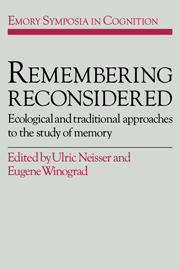Book contents
- Frontmatter
- Contents
- Preface
- List of contributors
- 1 New vistas in the study of memory
- 2 Continuities between ecological and laboratory approaches to memory
- 3 Memory for randomly sampled autobiographical events
- 4 Ordinary everyday memories: Some of the things of which selves are made
- 5 Walking in our own footsteps: Autobiographical memory and reconstruction
- 6 Memory observed and memory unobserved
- 7 The maintenance of marginal knowledge
- 8 The content and organization of autobiographical memories
- 9 The ontogeny of memory for real events
- 10 The functions of event memory: Some comments on Nelson and Barsalou
- 11 “The Wreck of the Old 97”: A real event remembered in song
- 12 Passive remembering
- 13 Remembering without experiencing: Memory for reported events
- 14 What is ordinary memory the memory of?
- 15 Go for the skill
- Name index
- Subject index
9 - The ontogeny of memory for real events
Published online by Cambridge University Press: 25 March 2010
- Frontmatter
- Contents
- Preface
- List of contributors
- 1 New vistas in the study of memory
- 2 Continuities between ecological and laboratory approaches to memory
- 3 Memory for randomly sampled autobiographical events
- 4 Ordinary everyday memories: Some of the things of which selves are made
- 5 Walking in our own footsteps: Autobiographical memory and reconstruction
- 6 Memory observed and memory unobserved
- 7 The maintenance of marginal knowledge
- 8 The content and organization of autobiographical memories
- 9 The ontogeny of memory for real events
- 10 The functions of event memory: Some comments on Nelson and Barsalou
- 11 “The Wreck of the Old 97”: A real event remembered in song
- 12 Passive remembering
- 13 Remembering without experiencing: Memory for reported events
- 14 What is ordinary memory the memory of?
- 15 Go for the skill
- Name index
- Subject index
Summary
The focus of this chapter is on how memory for real-life events–both specific episodes and general schemas–develops in the early years of childhood. To begin the discussion, it is useful to consider an example of such memory in a very young child. This example is taken from a very rich corpus of material that was obtained by periodically recording the presleep monologues of a child, Emily, between the ages of 21 months and 3 years. The first example in the Appendix is taken from the very earliest recordings to give a flavor of this material. At a later point I shall consider how the monologues changed and developed over time.
In this first example, Emily talks about a real event that, according to her mother's report, had occurred 2 months earlier when one of their cars was being repaired and they had to use the other one, an unusual event in Emily's experience. Her mother was sure that no similar event had taken place in the interim period. Evident in this example are some of the characteristics of presleep monologues of 2-year-olds that have been noted by other researchers, for example, repetition of utterances with substitution and rephrasing. Of some interest here are occasional apparent intrusions into the main topic (e.g., the reference to her friend Carl). However, more impressive is the sustained topic over roughly 30 separate (although not different) propositions.
- Type
- Chapter
- Information
- Remembering ReconsideredEcological and Traditional Approaches to the Study of Memory, pp. 244 - 276Publisher: Cambridge University PressPrint publication year: 1988
- 48
- Cited by

